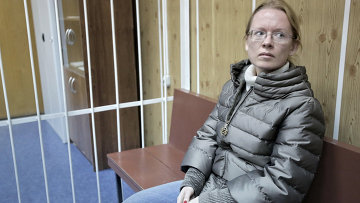MOSCOW, November 19 - RAPSI. Yekaterina Smetanova, who is a suspect in the Oboronservis defense holding embezzlement case, has been transferred from her temporary detention facility to the Lefortovo investigative isolation ward, attorney Ruslan Zakalyuzhny told RAPSI on Monday.
Zakalyuzhny received the information from an investigator, who said that he plans to question Smetanova about her defense in the case.
"The investigator has received two applications from Smetanova with the same date," he said. "According to one of the documents, Koblev and I will represent her interests. But pursuant to the other document, she has refused the use of a lawyer entirely."
Smetanova must personally inform the investigator of her decision, he said.
However, Smetanova was transferred on Monday from the facility where she had stayed for almost 20 days, although 10 days is the limit by law, Zakalyuzhny said.
As she will have to spend several days in quarantine at the Lefortovo investigative isolation ward, the issue of her defense will not be resolved before Thursday.
He added that this situation has likely been created artificially by the investigators to prevent the issue of her defense from being dealt with before the appeal against her arrest is considered.
The case materials state that Smetanova is suspected of committing five crimes as part of the case initiated against Oboronservis on selling property at reduced prices.
It became known in October that five criminal cases had been initiated in connection with fraud in sales of property, land plots and shares, which used to belong to Oboronservis. The losses exceeded 3 billion rubles ($95.7 million).
Investigators searched the Defense Ministry’s department of property relations and offices of affiliated bodies, took a number of documents and questioned employees. In addition, three million rubles ($95,700), jewelry and antiques were confiscated from Yevgenia Vasilyeva.
Oboronservis comprises service companies involved in armaments and military vehicle repair and maintenance, construction materials and food production, power facilities operation, cartography and printing goods production, as well as housing services for military towns.



